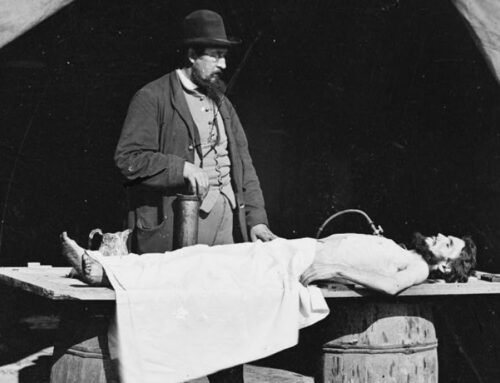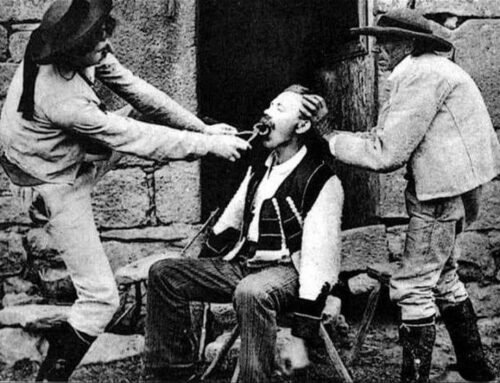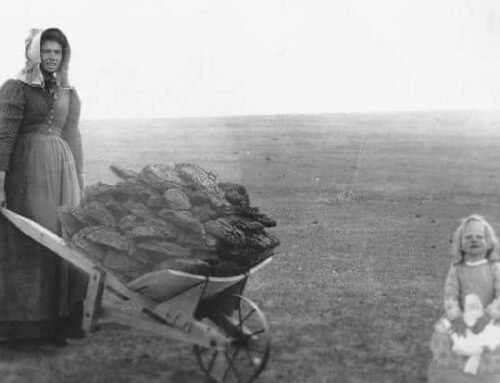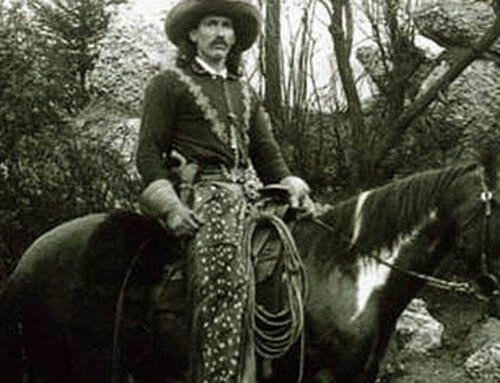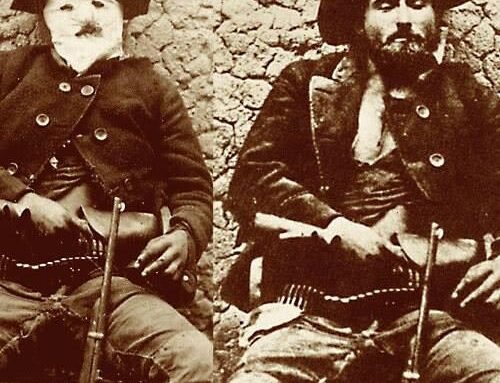Charley Parkhurst
By western author Nick Brumby
 “She out-swore, out-drank, and out-chewed even the Monterey whalers.”
“She out-swore, out-drank, and out-chewed even the Monterey whalers.”
–Unknown companion of Charley Parker
The West was a land of big stories and bigger personalities. However Charley Parkhurst possibly had the biggest story of them all. Charley was a tough tobacco-chewing, whiskey drinking, cursing, gambling, California stage driving gun killer. Oh, and did I mention that Charley was actually a woman?
Charley had more grit than most men:
- Lost an eye and wore an eyepatch after being kicked by a horse
- Became one of the best stagecoach drivers on the West Coast during the Gold Rush
- Shot two stagecoach robbers dead
- Earned the nicknames ‘One-eyed Charley’, ‘Boss of the Road’, and ‘Six-horse Charley’ out of sheer respect
Charley went about having adventures as a man for more than 50 years without anyone being the wiser. In fact, Charley was also the first woman to register to vote in the United States (this was 50 years before the 19th amendment giving women the right to vote). More on this later.
Charlotte Darkey Parkhurst was born in 1812, in either New Hampshire or Vermont. Charley’s mother died the year of her birth. After an older brother died in 1813, Charlotte and sister Maria went to an orphanage.
 When about 12 years old, Charley dressed in boys’ clothing and ran away. Maintaining the disguise, he eventually found work at a livery stable in Worcester, Massachusetts, earning room and board by cleaning stalls, scrubbing floors and washing carriages. Charley had an aptitude for horses, and the stable owner taught him how to handle them.
When about 12 years old, Charley dressed in boys’ clothing and ran away. Maintaining the disguise, he eventually found work at a livery stable in Worcester, Massachusetts, earning room and board by cleaning stalls, scrubbing floors and washing carriages. Charley had an aptitude for horses, and the stable owner taught him how to handle them.
Charley began to earn money driving stagecoaches and eventually became known as one of the best drivers on the East Coast. In the late 1840s miners began to flock to California in search of gold. Charley followed them, arriving by steamer in San Francisco in 1851, aiming to be “the best damn driver in California.”
Charley drove for several different stagecoach companies in California, including Wells Fargo, which then handled the purchase, sale, and transport of gold dust, bullion, and other goods. Soon he was known as one of the best drivers on the West Coast and earned the nickname, “Six Horse Charley”.
Charley could flick a fly off a horse’s butt with a bullwhip without touching the animal. He could also spit tobacco juice in the ear of the lead horse to get its attention.
 In 1880 the New York Times wrote: “It was an honor to sit in the spare end of the driver’s seat when the fearless Charley Parkhurst held the reins of a four or six in hand.”
In 1880 the New York Times wrote: “It was an honor to sit in the spare end of the driver’s seat when the fearless Charley Parkhurst held the reins of a four or six in hand.”
Despite a reputation as a ‘man’s man’, Charley stood about five foot six tall, being broader across the hips than the shoulders, and was said to have a high-pitched voice. Charley dressed in tailored coats, handmade boots and a broad gray hat. No matter the weather he wore long-fringed, beaded gloves – perhaps to hide small women’s hands. Charley drank whiskey, chewed tobacco, smoked cigars and talked to the horses. His profane vocabulary sometimes left passengers spellbound.
Charley also had only one good eye and wore a left eye patch, after being kicked in the head by a horse about 1856. The patch undoubtedly contributed to his reputation for toughness. During the Gold Rush, there were few in the West as notorious and formidable as the stagecoach driver. One of Charley’s unknowing companions would say: “she out-swore, out-drank, and out-chewed even the Monterey whalers.”

People called Charley “boss of the road.” One account says that when asked how it was possible to make way through all the dust, he replied, “I’ve traveled over these mountains so often I can tell where the road is by the sound of the wheels. When they rattle, I’m on hard ground; when they don’t rattle, I gen’r’lly look over the side to see where she’s agoing.”
Drivers, or “whips,” also faced highwaymen who ordered them to throw down the wooden box that carried payroll or gold. Charley was adept with the whip and the pistol as well as the reins of a Concord coach. Charley shot at least two bandits and could cut the cigar from a man’s mouth at 15 paces without touching him.
Charley often faced down danger on the job. In 1858 a notorious bandit named Sugarfoot robbed Charley’s stagecoach. on the road from Stockton to Mariposa. The gang of highway robbers disguised their faces with masks made from long underwear. They held a gun to his head and threatened the passengers. Charley was forced to give the bandits the money box. Sugarfoot made off with $100,000 in gold dust. He vowed revenge. When Sugarfoot attempted a second robbery a few months later, Charley shot and killed him.
 Later, Charley was urging the horses through mudholes in a Grass Valley creek bed and a highway robber ordered him to put up his hands. Charley cracked a whip across the robber’s eyes, blinding him in one of them. Despite these tales, Charley’s proudest accomplishment was never capsizing a stage or injuring a passenger.
Later, Charley was urging the horses through mudholes in a Grass Valley creek bed and a highway robber ordered him to put up his hands. Charley cracked a whip across the robber’s eyes, blinding him in one of them. Despite these tales, Charley’s proudest accomplishment was never capsizing a stage or injuring a passenger.
Parkhurst decided during the Civil War to retire to farm life, according to the Santa Cruz Sentinel. For a while he ran a stage stop on the Santa Cruz to Los Gatos road. Charley then bought a little spread somewhere between Soquel and Watsonville. He built a two-room cabin and planted an apple orchard.
Never one to remain idle, the former stagecoach driver, then past 60 years of age, turned to lumberjacking, raising cattle and occasionally hauling freight for neighbors.
Charley stopped driving stagecoaches in the 1870s, in part because of the expansion of railroads in California. He went on to operate a way station and saloon along the route between Santa Cruz and Watsonville but eventually sold that business, along with a stake in a cattle ranch.
Charley died in 1879 from cancer of the tongue, After he died a little red trunk filled with baby clothes was found in his cabin., all that was left of a long-lost child.
 Upon Charley’s death, it emerged that he was actually a woman. It was discovered that in 1868 Charley may have even voted decades before women had the right to vote! There is no record of him actually casting a vote, but the name Charles Darkey Parkhurst is listed on the official poll list for the election of 1868. Women were finally given the right to vote in California in 1911.
Upon Charley’s death, it emerged that he was actually a woman. It was discovered that in 1868 Charley may have even voted decades before women had the right to vote! There is no record of him actually casting a vote, but the name Charles Darkey Parkhurst is listed on the official poll list for the election of 1868. Women were finally given the right to vote in California in 1911.
Charley’s legacy and the example she set for others lived on. After the Civil War, three separate women in Colorado and Wyoming wore men’s clothes and called themselves Mountain Charley. Harry Allen, born female, was a petty criminal in the Pacific Northwest who refused to wear women’s clothes. A lumberjack named Sammy Allen died at the age of 80 in Montana, and, like Charley Parkhurst, was discovered to have been a woman.
Shortly after Charley died, the San Francisco Call reported on her death: “The discoveries of the successful concealment for protracted periods of the female sex under the disguise of the masculine are not infrequent,” reported the newspaper. “But the case of Charley Parkhurst may fairly claim to rank as by all odds the most astonishing of all of them.”

About Nick Brumby
I like a good story. And of all stories, I love westerns the most.
As a kid, I spent far too many afternoons re-watching Clint Eastwood spaghetti westerns, picking up ‘Shane’ for just one more read, or saddling up beside Ben Cartwright when ‘Bonanza’ was on TV each afternoon.
I’m a former journalist and I love horses, dogs, and the occasional bourbon whiskey. I live with my wife, daughter and our ever-slumbering hound in a 1800’s-era gold mining town – our house is right on top of the last working gold mine in the area. There may not be much gold left, but there’s history wherever you look.
I hope you enjoy my westerns as much as I enjoyed writing them!
Happy trails,
Nick























